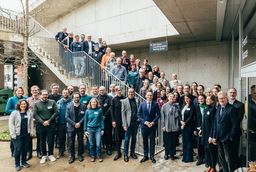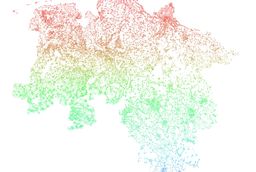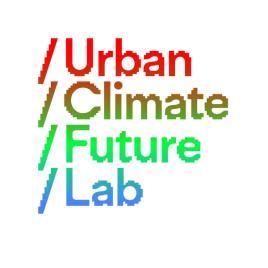Urban Climate Future Lab
Urban Areas and Climate Impact - a Future Lab for Multidisciplinary Knowledge and Sustainable Transformation (UCFL)
The aim of the Urban Climate Future Lab is to develop and refine new models and instruments for the assessment and transformation of urban areas in times of climate change.
The Urban Climate Future Lab (UCFL) is a multidisciplinary research initiative to analyse the complex relationship between urban development, climate change and climate protection. While the Climate Future Lab is initially focussing on Lower Saxony, the research results and methods will also be transferable to other contexts. The Urban Climate Future Lab project is divided into two interconnected phases:
- Phase I focusses on system knowledge: How do different settlement types in Lower Saxony's urban system contribute to climate change and how are they affected?
- Phase II focusses on transformation knowledge: How can Lower Saxony's urban system and its constituent elements be transformed to reduce climate effects and increase resilience and sustainability?
To increase the research's impact, UCFL cooperates with researchers, business, civil society, planning authorities and NGOs. The various facets of urban-climate dynamics are addressed holistically. The methods applied are inter- and transdisciplinary and combine findings and techniques from urban and landscape planning and design, engineering, natural and social sciences, governance and climate research. This is crucial for understanding the role of urban systems in climate change. Transformation strategies are formulated on the basis of these findings. Collaborative approaches are used to involve stakeholders in scenario building, visioning and narrative development.
Transformation strategies and paths
These activities combine to form transformation strategies and pathways that are based on a differentiated understanding of the specific climate impacts of different types of settlements in the urban system. A key aspect of the project is to strengthen the resilience of the urban system and transform it towards climate neutrality. The UCFL brings together a strong interdisciplinary team from TU Braunschweig, Leibniz Universität Hannover, Leuphana Universität Lüneburg, the Academy for Spatial Development in the Leibniz Association and the Climate Service Centre Germany. This expertise is complemented by an advisory board of (inter)nationally renowned experts, so that the project results find resonance and reflection on a global level. The UCFL's innovative approach is characterised by its holistic and interdisciplinary framework.
This approach is not limited to theoretical knowledge. It addresses real-world application in climate mitigation and adaptation strategies in the urban context. The expected results are far-reaching. They achieve a transformative impact on urban spaces through the development of strategies for sustainable transformation. The aim is to establish a model for continuous monitoring and further improvement of urban development strategies and thus create a dynamic framework for adaptation to climate change. The Urban Climate Future Lab also supports politics and practice by providing feasible recommendations and guidelines for decision-makers and stakeholders from politics, administration and industry.
Further information on the Urban Climate Future Lab can be found on the project website.
Spokesperson

Subprojects
Urban Settlement Patterns and Development Scenarios
ExploreIntegrated planning of sustainable mobility and the urban environment
ExploreUrban Factories and Industrial Symbiosis
ExploreResources
ExploreHolistic accounting and climate-friendly transformation of urban open spaces
ExploreClimate Change Impact Assessment
ExploreCitizens’ narratives of climate change risks in urban areas
ExploreIntegrative governance for resilient and climate just spatial transformation
ExploreJoint Knowledge, Data and Scenario Lab
Explore
Blog
All
1.5 – one scientist, five questions with Prof. Astrid Kause
Professor at the Institute for Sustainability Psychology at Leuphana University Lüneburg and co-speaker of the Urban Climate Future Lab
5 min. Reading time
Kick-off for Lower Saxony's Climate Future Labs
Science, business, politics, practice and foundations meet for the climate future
3 min. Reading time
Identifying and tackling climate challenges at the local level
Interview with Urban Climate Future Lab spokesperson Prof. Dr. Vanessa Carlow
9 min. Reading time
